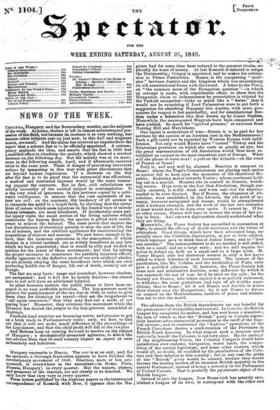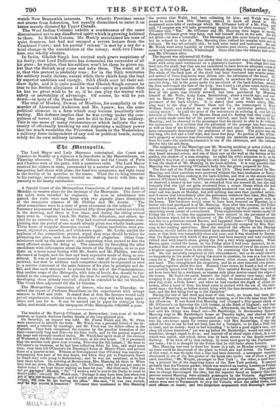The advices from the British dependencies are not hopeful for
the permanence of tranquillity and concord. In Canada, t he British League has completed its session, and has sent home a manifesto, the sum of which is, that the "British" party in Canada regret- fully hankers after commercial protection in the tariff of the Eng- lish customs, and to counteract the " factious" operations of the French Canadians desires a confederation of the Provinces in British North America. In what respect such a measure could materially benefit the Colonies, is not very clear. By the analogy of the neighbouring Union, the Colonial Congress would have jurisdiction over customs, navigation, waste lands, the compo- sition of the central legislature, and some other matters, which would all, no doubt, be modified by the peculiarities of the Colo,_ nies and their relation to this country ; but in any case the pride of the " British" party would be solaced, because they would become the leading section of an immense British majority in the central Parliament instead of being a minor..y in the Parliament of United Canada. That is probably the p :amount object of the British League. Invited to join the League, New Bru wick has astutely esta- blished a League of its own, to corms Aid with the other end. watch New Brunswick interests. The Atlantic Province seems not averse from federation, but equally disinclined to enter it on terms merely dictated by Upper Canada. The West Indian Colonies exhibit a continuance of the same discontented not to say disaffected spirit which is growing habitual to them. In British Guiana, Mr. Barkly maintained his tone of quiet firmness, but had not escaped a severe lecture from the Combined Court ; and his partial " reform" is met by a cry for a total change in the constitution of the colony, with two Cham- bers, one wholly elective.
In India, Gholab Singh has excited such grave suspicions of his fealty, that Lord Dalhousie has demanded the surrender of all his guns: he replies, that his soldiers won't let them be given up, but that the British may come and take them. The worst of it is, that this pretext is probably true ; for in the Sikh territories the soldiery really dictate, except while their chiefs keep the lead by superior ambition and energy. Sikh chiefs must let their sol- diers fight, and it is quite possible that Gholab Singh cannot be true to his British allegiance if he would—quite as possible that he has no great wish to be so, if he can play the traitor with safety or probability of advantage. Of course, he will be put down—in spite of the Peace Society ! The trial of Moolraj, Dewan of Moultan, for complicity in the murder of Lieutenant Anderson and Mr. Agnew, has the same political element in a form which may become peculiarly inte- resting. His defence implies that he was acting under the com- pulsion of terror, taking the part he did in fear of his soldiery. This is one more of many circumstances which indicate the ne- cessity of effectually breaking up and dispersing a military power that too much resembles the Praetorian bands or the Mamelukes, a military force independent of any soil or political bonds, acting solely for its own military interests.



























